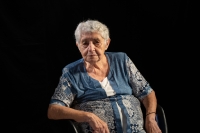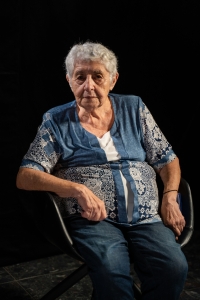I still suffer from anxiety and fear, but there is something stronger in me that always pushes me forward

Download image
Alica Weiszfeiler, born Goldman, was born on November 28, 1933 in Moravská Ostrava. Her family was of Jewish origin and immigrated from Slovakia. In 1939, they were forced to move back to Slovakia. Uncertain times awaited them there due to the growing power of anti-Semitism. In Bratislava, it became increasingly difficult for Jews to live, so the father decided that he and his family would move to Kežmarok. The family was later forced to hide in Kežmark to avoid being transported to concentration camps. However, Alica’s father and brother were caught and put in prison. Finally, Alice and her mother also ended up in it, and later the family did not even avoid transport. She arrived in front of the crematoria of the Auswitz-Birkenau camp, where the Nazis divided the family. Alica and her mother continued to the concentration camp in Ravensbrück. Before liberation, they found themselves in Bergen-Belsen in appalling living conditions, where the Nazis left them hungry and thirsty. Many prisoners died in the camp. The camp was liberated by British troops. At that time, there were about 60,000 prisoners in it. The British set up a camp for the sick, where Alice’s mother was also placed. Alica’s mother died of typhus. Alice found herself in an orphanage. At that time, many children were headed for adoption in Sweden to local families. Little Alica refused, however, because she wanted to get back to Slovakia. She was convinced that she would meet her father and brother. She first got to Prague, where her uncle found her in a children’s home, and then quickly traveled to Kežmarok. Alica’s father remarried and Alica got a half-sister. Later he moved to Israel and Alica went to study in Belgium. After her studies, she found herself in Israel, where she started a new life and finally married Alfred Weiszfeiler there. 10 grandchildren and 11 great-grandchildren were born into her family.

